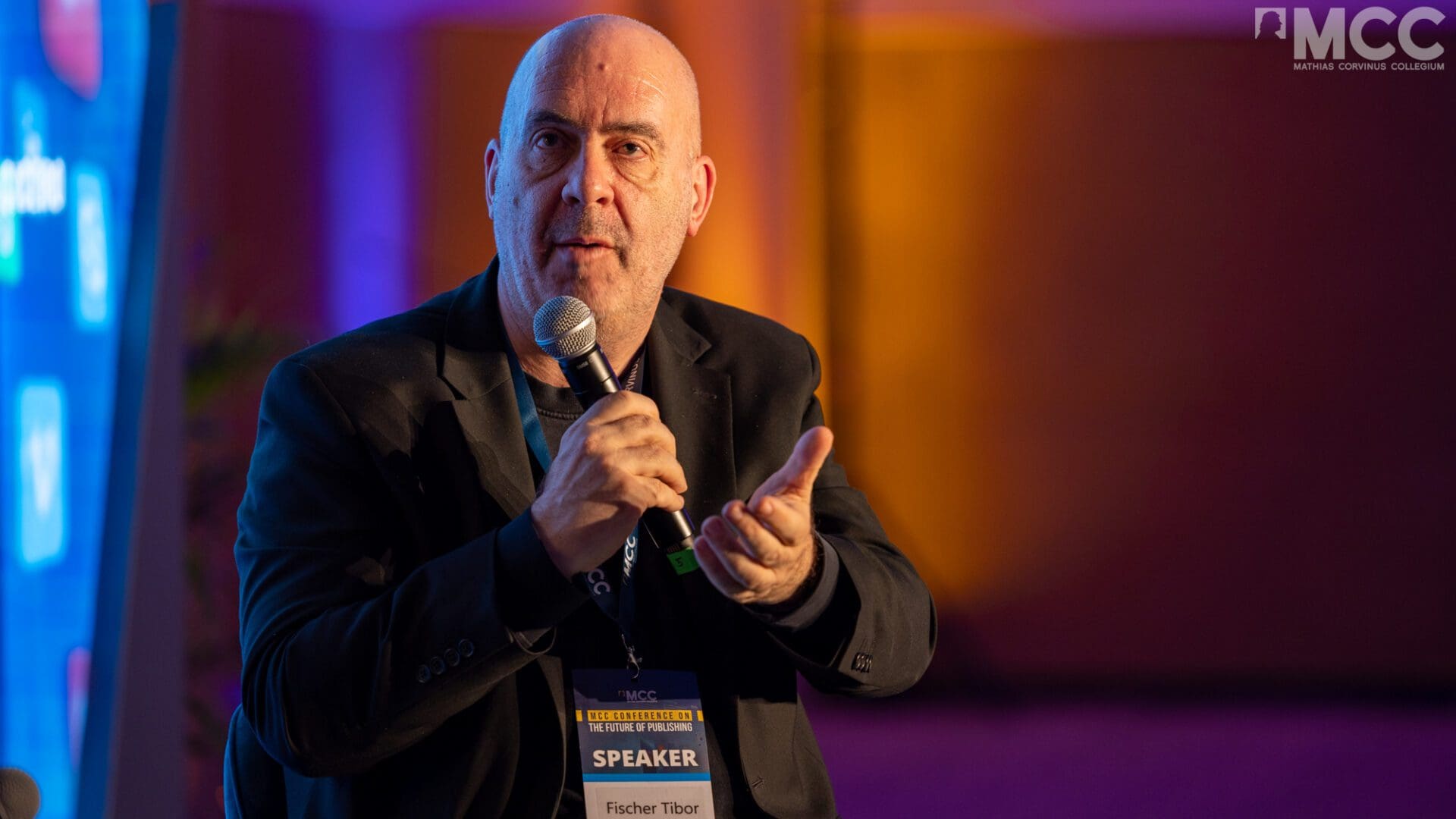On the sidelines of the MCC conference titled The Future of Publishing held between 25 and 26 January in Budapest, Hungarian Conservative interviewed novelist, commentator Tibor Fischer, head of MCC’s Literary Centre.
As a novelist, what do you know about your reader base? Do you have a lot of Hungarian readers?
It’s hard to judge that for sure. Nearly all my books have been published here in Hungary. And the one that has not yet been published is going to be done by MCC this year. So then Hungary will be the only country in the world that would have done everything. There are other places – Spain, Italy – where I’m popular. Even Russia bizarrely, where they have done most of the books, but Hungary will be the only one that will have done all of them. And in fact the first translation of my first novel, ‘Under the Frog’, was here in Hungary which surprised me a little bit because I thought that Hungarians have plenty of Hungarian writers to read. On the other hand, one of the paradoxes about 1956 is that although it’s probably the second biggest event in Hungary during the 20th century, there wasn’t that much written about it in terms of literature. There were some books that went up to 1956, and those about the aftermath of 1956, but there were very few books about what actually happened in that year. So, the Frog has been republished a number of times which would mean that someone is interested. However, it’s hard to judge readership. People who read seem to have heard of me which is always very nice. But essentially I am a British novelist, I write in English, and I would say that Britain is where I am best known.
Here at this conference, there are panel discussions about the role of the digital media. I can see its effects on journalism, but how do you view it as a novelist? Do you think it takes away from the readers’ experience?
I do think that audiobooks take away from the experience. Because it’s not quite the same thing as reading a book. But I’m not unhappy that some people prefer to listen to a book while driving or doing the washing up. The digital revolution for a writer is sort of a double-edged sword. Because on one hand, it means that if there is an e-book, in a sense it is immortal, since it is not going to go out of print, because as long as there is a medium where it can be played on, it will be available. If someone in Indonesia wants to buy my book at 2 in the morning, it’s great because they can go on Amazon or some other site and they can download it. The downside of digital is the downside of the whole arts, music, literature, movie world, the piracy. Once it is digital, it can go everywhere. So, it sort of swings and roundabouts because it’s easier now than ever to have a global audience, if people want to find your book, it is very easy. The downside is that you may not get as much revenue as before, because inevitably some people will not get copies or not buy the e-book. Ultimately, as a writer you want to be read, but it is nice to be able to pay the bills as well.
You have written pieces that defend Hungary in the past. What motivated you to do so?
My views are more to the right than otherwise, but when we’re talking about the pieces I wrote in defence of Hungary, I wouldn’t say that it is in defence of the current government as such. I see it more as defending Hungary. Because in the Anglo-Saxon and most of the Western European press
Hungary is often referred to as a dictatorship, saying that Fidesz is far-right and antisemitic. And that is verifiably untrue,
that is the angle that makes me slightly angry. People who refer to themselves as journalists are writing things that are simply untrue, things that with a little bit of checking they could see that it’s nonsense. The government here, whatever you think of it or whatever their thoughts, it’s a democratically elected government. They’re not far-right, and there is no antisemitism. I’ve actually challenged people, journalists, one in particular who wrote a piece about Orbán being antisemitic, and I asked him to provide me with evidence. I said: ‘Could you please give me an example of a speech or some sort of action that could be considered antisemitic?’ And of course, he couldn’t. He just sort of backpedalled into ‘You know, Orbán is resurrecting antisemitic tropes.’ Because as they see it, this is all about Soros. But as far as I’m aware, none of the governments’ communication about Soros ever mentioned the fact that he’s Jewish. He spends his money on left-wing causes, to which he’s completely entitled to do, it’s his money and his business. And in the early nineties he did some good as well, for the Hungarian opposition nonetheless, but he does openly finance a lot of left-wing causes. So, if you’re a right-wing party, of course you’re entitled to criticise that.
Last year at an MCC panel you were asked about the meaning of life. You said something to the effect of ‘Make the most of it’. Did that idea change since for you?
In a way, these panels are sort of silly, you have to come up with some sort of response that sounds good. I think the question actually was ‘if you could choose one word to describe your philosophy of life what would it be’. And I said fun.
Because you might as well try to enjoy it while you’re here.
I don’t think it is a particularly original or brilliant observation, but I do believe that one should try to make the most of it.
With the new-found success of AI platforms that are able to compose whole essays or generate pictures. artists and writers are starting to feel threatened. What is your take on this ‘revolution’?
It’s slightly worrying for writers, yes. At the moment, however, I don’t think it’s good enough to be a challenge, but what is worrying is that through the course of my lifetime I’ve seen how technology developed at quite an alarming rate. For example, robots. When I was a kid they were sort of a joke, they were vending machines basically. And now you can see what Boston Dynamics are doing, I genuinely find it a little bit scary. And probably with AI, if it continues to develop, not next year, but maybe in ten years or so, they’ll be able to write decent novels, or very good film scripts even. As a writer it is alarming, but fortunately for me I don’t think it will be a pressing problem. The threat is on the kids who are in their twenties now who want to write novels that may find themselves facing serious competition from AI.

In Hungary, it is not easy to acquire books in the original language. Do you think that this could defer some readers who would like to read your pieces in English?
I don’t believe so, because everything is available online now. Of course, ordering it from Amazon for example, for a Hungarian could be a fairly expensive exercise. But I hear it all the time that all books are available on pirate sites. And I believe that if you’re a student, or just short of cash – of course, I’d prefer it if you bought the book – but if you want to read it, and later on you have some money maybe you can buy it as a gift for someone. The digital part is as I mentioned a mixed blessing. If someone reaches out from Australia for example, I can send them a book over the internet. And keeping a book in print is also not easy. Even in Britain, a couple of my novels are now out of print, and once you fall out of print and you’re not in the shops, it’s rather hard to get back in. Because not unreasonably, shops want books that are going to be selling quickly. The only people as far as I know that have my entire back-catalogue are the big bookshops in London. But even in Britain, Amazon and the online ordering is essentially a good thing for writers. Because a lot of people don’t live near a bookshop, so they can just order it. And you know, even I find it annoying if I go into town to look for a book and it turns out that they don’t have it. You’ve wasted a trip whereas if you order it from Amazon, they will get your book and they’ll deliver it. And you usually even save like one pound on it. And also, I wrote the ‘Hungarian Tiger’, where Amazon did a thing called ‘Amazon Singles’ making an effort to get into the publishing business themselves. This was for essays and short stories, named after the vinyl singles. I wrote it for them. I have to say that in terms of paying royalties, they’re the best publisher I ever dealt with. Every month on the dot it turns up. Like five pence or something, but it does turn up!
As a novelist, are you ever forced to write from a point of view you would not write otherwise, purely because a publisher demands it?
It can happen, but it depends on who you are and how successful you are, I think. I mean if you’re a successful writer, you can do anything you want. If you are J.K. Rowling or Dan Brown, if you ask your publisher to deliver their 14-year-old daughter naked on your doorstep, they would do it. If you’re not selling at that level, however, sometimes you get arguments like ‘is this chapter working?’ or something along the lines. I don’t think it came to Britain yet, but in America you have the sensitivity readers, who are saying that ‘this Mexican character does not look good here’.
And the younger generation of publishers have become very much like activists.
And I’m talking about the fiction market, they really feel that when they publish a novel it should do something to improve the world in some way—socially or regarding climate change. That may be narrowing the focus a little bit. If your novel doesn’t have sort of a positive upside about something, it might be harder to get published. Having said that however, it has always been hard to get published. It’s not a new battle. You will find very few writers who will just say that ‘I knocked off a manuscript on the weekend, sent it to an agent and it was published next year.’ That doesn’t happen very often. It is also difficult to garner a readership. And the other thing that has changed since I started 30 years ago is that then, if you were taken on by a publisher, you generally got three or four tries. Publishers then understood that your first book will probably not be a huge success and they’d stick with you as you improved. Now I think it’s a much harsher climate. If your first book does not do really well, you are done. And as I said, once you are out of the magic circle, it’s very hard to get back in it. Because what also changed since is the internet. 30 years ago, if you had a good agent, they could con publishers saying ‘you know, his last book did really well’. Now they can check the electronic point of sale with one click, and they can see that even if you had very good reviews, the thing that matters is how many books you actually sold. The only consolation I have is that at least I’m not a Hungarian writer, because I don’t know how they survive, really.








